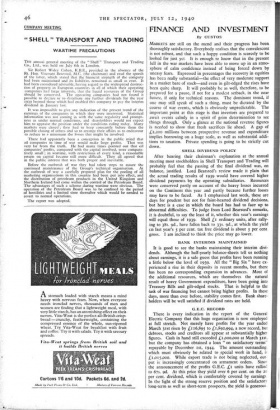FINANCE AND INVESTMENT
By CUSTOS
MARKETS are still on the mend and their progress has been thoroughly satisfactory. Everybody realises that the convalescent is not robust, and that such a happy condition is scarcely to be looked for just yet. It is enough to know that in the present lull in the war markets have been able to move up in an atmo- sphere of calm confidence instead of being forced down by uneasy fears. Expressed in percentages the recovery in equities has been really substantial—the effect of very moderate support in a market bare of stock—and even in gilt-edged the rises have been quite sharp. It will probably be as well, therefore, to be prepared for a pause, if not for a modest setback, in the near future, if only for technical reasons. The dominant trend, if one may still speak of such a thing, must be dictated by the course of war events, which is obviously unpredictable. The important point at this stage is that investors are prepared to await events calmly in a spirit of grim determination to see things through. Only a glance at the national revenue figures is needed to show that fresh sacrifices lie ahead. A gap of £2,200 millions between prospective revenue and expenditure implies borrowing on a huge scale, as well as substantial addi- tions to taxation. Private spending is going to be strictly cut down.
SHELL DIVIDEND POLICY
After hearing their chairman's explanation at the annual meeting most stockholders in Shell Transport and Trading will probably feel that the passing of the final dividend was, on balance, justified. Lord Bearsted's review made it plain that the actual trading results of 1939 would have covered higher dividend payments by the operating subsidiaries. Resources were conserved partly on account of the heavy losses incurred on the Continent this year and partly because further losses may have to be faced. As I emphasised last week, these are days for prudent but not for faint-hearted dividend decisions, but here is a case in which the board has had to face up to abnormal difficulties. To judge from Lord Bearsted's remarks, it is doubtful, to say the least of it, whether this year's earnings will equal those of 1939. Shell Li ordinary units, after rally- ing to 38s. 9d., have fallen back to 33s. 9d., at which the yield cn last year's 5 per cent. tax free dividend is about 5 per cent, gross. I am inclined to think the price may go lower.
BANK INTERIMS MAINTAINED
It is good to see the banks maintaining their interim divi- dends. Although the half-yearly balance-sheets tell us nothing about earnings, it is a safe guess that profits have been running a little below the level of 1939. All the " Big Six " have ex- perienced a rise in their deposits in recent months, but there has been no corresponding expansion in advances. Most of the additional resources, which are themselves the natural result of heavy Government expenditure, have been going into Treasury Bills and gilt-edged stocks. That is helpful to the task of war financing but cannot bring higher profits. In these days, more than ever before, stability comes first. Bank share- holders will be well satisfied if dividend rates are held. •
G.E.C. RECORD
There is every indication in the report of the General Electric Company that this huge organisation is now employed at full stretch. Not merely have profits for the year ended March 31st risen by £116,895 to £1,892,994, a new record, but debtors, stocks and creditors all appear at substantially higher figures. Cash in hand still exceeded Li,000,000 at March 31st, but the company has obtained a loan " on satisfactory terms" repayable by December ist, 1944. The amount outstanding, which must obviously be related to special work in hand, is £1,015,000. While export trade is not being neglected, out- put is increasingly concentrated on armament orders. Since the announcement of the profits G.E.C. Li units have rallied to 67s. 9d. At this price they yield over 6 per cent. on the 20 per cent. dividend, which is comfortably covered by earnings. In the light of the strong reserve position and the satisfactory long-term as well as short-term prospects, the yield is generous


























 Previous page
Previous page